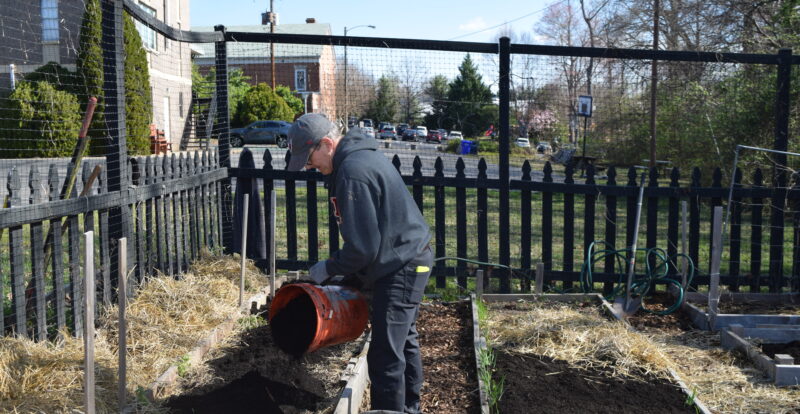As Earth Day approaches, we’re excited to share the ways Food for Others is making a positive impact on our planet every day! From composting to food rescue and community gardens, we’re dedicated to creating a better environment for all. Learn more about the ways we are committed to creating a more eco-friendly, sustainable food system.
Food Rescue
In FY23, 39% of our food was “rescued”. Food rescue, otherwise called food recovery, is the process of collecting edible food that would have otherwise been thrown away or wasted. Rescued food comes from a variety of sources including grocery stores and farmers markets.
The availability of rescued food depends on the location – we visit many grocery stores daily, picking up food with an upcoming best by date. Alternatively, farmers market food rescue is seasonal – opportunities to “glean” produce are available during the summer and fall months.
Food rescue is an important part of maintaining a sustainable, eco-friendly food system. Food banks and pantries have the means to distribute food quickly – placing us in a unique position to distribute food that would have otherwise gone to waste.
Composting
While rescued food is a significant portion of our total distribution, not every food item we receive can be given out. Our team carefully inspects every food item, including produce, and determines whether it can be given out. When possible, the food that doesn’t pass inspection is composted instead of thrown away. Composting gives food scraps a second life – converting them to an important tool for many farmers, a nutrient dense mixture that helps growing plants thrive.
While composting can be done at home, Food for Others partners with Compost Crew, a Maryland based company who picks up food scraps and delivers it to their facility. Compost Crew then manages the conversion of scraps to compost.
Food waste contributes to 24% of the garbage in landfills – a significant part of a massive problem. Despite decomposing in landfills, these scraps cannot be converted to compost. Compost relies on aerobic decomposition, meaning oxygen is required for the process to occur. Oxygen is limited in landfills due to the quantity of garbage – food and trash is packed in so tight oxygen does not have the space to exist in the quantities needed to create compost. Instead, the food scraps go through anaerobic decomposition, a process that does not require oxygen. Anaerobic decomposition creates methane – a potent greenhouse gas.
Composting reduces the garbage in landfills while serving as a valuable tool for many gardeners – including FFO’s community gardeners!
Community Gardens
Food for Others supports three community gardens – offering food insecure families the option of growing their own produce. Families cater their gardens to their specific dietary needs and preferences while remaining mindful of the climate and in season produce.
Gardening has a plethora of benefits, including supporting a healthy environment! Plants, especially native plants and produce, bolster environmental biodiversity. The act of planting gardens reduces the impacts of soil erosion, the roots keep sediment in place and prevent it from seeping into the roads and walkways. This is especially beneficial in urban areas, where rapid development is commonplace. Plants also absorb carbon dioxide and air pollution while releasing oxygen.
Concepts like sustainability and environmental ethics can be intimidating – there are so many areas where each of us can improve. However, this also means there are so many ways, big or small, that we can support a healthy environment! Each small act makes a difference – whether you decide to plant produce in a pot on your patio, drop off your compost at a Fairfax County farmers market, or volunteer to glean produce at a farmers’ market.

